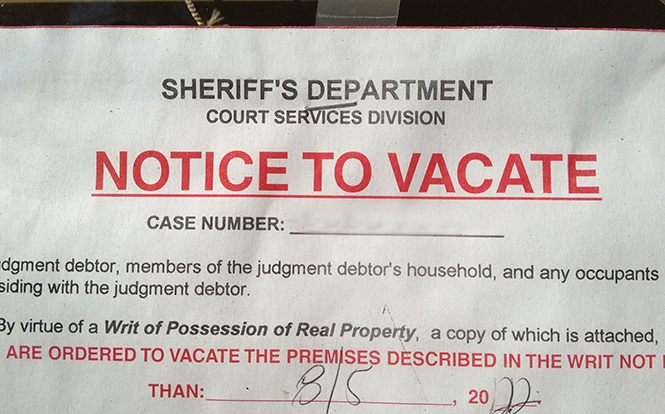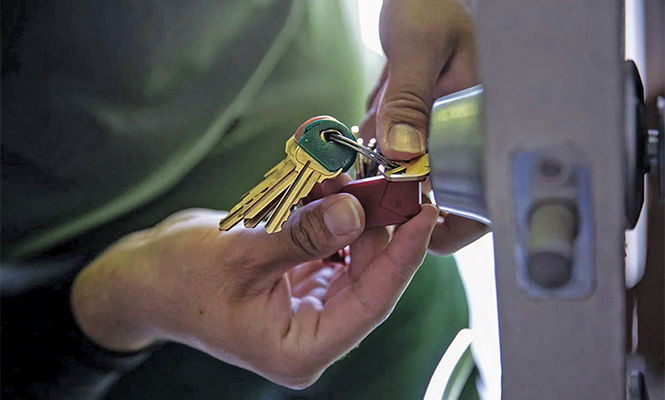Clean Slates
How to get an eviction off your record in Utah.
By Eric S. Peterson @ericspeterson, Silvia Nuila and Frank RegaladoThe following story was supported by funding from The Economic Hardship Reporting Project and reported by The Utah Investigative Journalism Project in partnership with Salt Lake City Weekly.
Have you ever been evicted? Do you wish it never happened? Thanks to a new law in Utah, you might be able to make it disappear from your legal record.
Tens of thousands of Utahns over the years have been evicted from their apartments and homes. It's not a crime to get evicted. It's not a crime to miss rent because you lost your job or ran out of money paying medical bills or fixing a broken car. It's not a crime if you miss rent because you are just trying to get through difficult times.
But having an eviction on your record can be as bad as having a crime on your record. It can hurt your credit score, making it harder for you to get a loan for a car or to get into your dream home. And your rental application for a nice new apartment might get rejected if the landlord sees you have an eviction on your record—even if it happened years ago.
But state law allows Utahns to expunge (see sidebar) an eviction from their records; in other words, evictees can wipe the slate clean as if it never happened. Even better? There's no cost to do it.
How long does an eviction stay on your record? It will stay on your rental history for seven years! And it will stay in the court record permanently if you don't have it erased.
There is no cost to have it erased, but it still is a legal process. This guide will help explain it in simple terms. For additional help, the contact information for free eviction resources is included at the end of this article.
It's helpful to think of the process as having three important stages: the "before," "during," and "after" stages. So, let's begin.
Before Expungement
Before we begin filling out paperwork, you probably have some questions. So let's hear them.
"Can my eviction be erased?"
That depends—not all Utah eviction records can be erased. If you were evicted because your landlord said that you broke apartment rules, the record cannot be erased.
For example: if you were smoking, had people stay at the apartment without permission from the landlord or didn't keep your place clean—these are the kinds of rules that you can get evicted for.
The same goes for breaking the law. If you were evicted because the landlord said you broke the law—even if the case never went to court—you can't get the eviction erased.
"How do I qualify to have my eviction erased?"
If you were evicted for not paying rent, you qualify. If you stayed past your lease—meaning the lease said you had to leave in January and you didn't leave until February or later—then you also qualify to have the eviction erased. In these cases, it doesn't matter how old the eviction was.
"Is that it?"
No, you also must have already paid your debt to the landlord who evicted you. This is called "satisfaction of judgment." If you haven't paid the money owed, then you can't get your eviction erased. So, satisfy that judgment!
"I already paid off my old debt—am I good to go?"
You'll need to prove that you paid off your debt. If you paid off your old debt and have receipts or other documents to prove it, make sure you know where those records are. The court may also have proof that you paid your debt and satisfied your judgment.
You can visit the Utah Courts' Self Help Center by visiting utcourts.gov/selfhelp, or by calling 888-683-0009. Ask if they can check your eviction court record to see if the court docket says the judgment was satisfied. They can also tell you which court and judge to send the paperwork to.
"OK, I think I'm ready to start the paperwork."
Wait—just one more thing to keep in mind: It's important the paperwork you file has an address where you can receive mail. So pick a secure mailing address for the eviction removal paperwork. You can put an e-mail address, but you'll also want a mailing address on the paperwork to be safe.
If you're nervous that giving your address is going to mean bill collectors come after you, you can use an address of someone close to you that will hold onto the mail for you. But make sure it's someone you can depend on, like your mom or dad—maybe not your boyfriend or girlfriend, unless it's serious (and congratulations, by the way).
OK, now we're ready to start the paperwork.
During Expungement
Here are the forms you'll need to start the process of removing the eviction from your record. (Find them online through the Utah Courts website— utcourts.gov):
The first is a civil cover sheet. This is your basic application to the court. It's two pages long. On Page 1, you fill in your information on the left as the "Plaintiff/Petitioner." A petition is a written request to the court, so requesting an expungement means you are the petitioner. On the right side of the page is the side for the landlord, or the "Defendant/Respondent."
At the bottom of the first page and on the second page is a lot of information that doesn't matter to you. Go to the bottom right corner of the second page and put a check next to "Expungement Petition."
Your next document is the "Petition to Expunge Eviction." This is a simple two-page document with one question and one signature line, asking the court to erase the eviction.
The other document is an "Order on Petition to Expunge Eviction." This document you leave blank, and the court will fill in the details when you send it to them, and they make a decision.
You send a copy of these documents to the court.
You also must send a copy of the documents to your landlord. You need to send the papers to your landlord so that they have the opportunity to challenge the expungement if they decide to. That leads to the last piece of paperwork.
You need to file a "Proof of Service" with the court. This is just proof for the judge that the landlord was served the paperwork.
"How do I serve my past landlord with the eviction expungement paperwork?"
Serving a paper means the legal document is delivered reliably to the other party—in this case, the landlord. That means you have someone hand-deliver the paperwork to the landlord. This someone could be a friend (as long as they are over 18, aren't part of your case, aren't a registered sex offender and don't have a protective order against them), or you could pay your county sheriff or a process server to deliver the paperwork to the landlord.
You can also just mail the paperwork to the landlord. But if you do, it must be certified mail with a return receipt requested. That way, the landlord has to sign for the letter upon receipt. The court will need to see the landlord's signature as part of your proof of service.
When the Civil Cover Sheet, the Petition to Expunge, the Order on Petition and Proof of Service have all been filed with the court and served on the landlord then it's time to ... wait.
Under the law, the landlord has 60 days to decide if they want to file an objection to your petition. Basically, they get a couple months to decide if they want to tell the court that your eviction record should not be erased.
Unfortunately, under the law, if the landlord says no to the expungement, that ends the process right there and the record won't be wiped clean.
But if there is no objection, the judge will approve the expungement.
Remember, the court needs to be able to get in touch with you. You should have given them an email and a good mailing address for yourself, or of someone who will keep an eye out for mail from the court for you.
It is possible the judge may want you to appear in court. They may have a question about your petition or proof that you satisfied your judgment.
It's more likely, though, that if the landlord has no objection, then the judge won't need to see you in court and can just approve the expungement on their own without you being present.
After Expungement
"OK, so my record was expunged! Is that it?"
Not quite. When it's expunged, you will be notified. You need to hold onto that record! So keep proof that your eviction was expunged. That is your proof that you have a clean slate. You need that because when the court wipes the record, credit reporting agencies will have 90 days to remove your eviction record from their files.
But it's possible that smaller apartments might not clear the records. If you do apply for an apartment and the landlord claims you were evicted, you will need proof of your expungement to show them that you have paid your past debt.
"So the eviction is gone from my record. But what if the landlord asks me straight up if I've been evicted before?"
If your case has been successfully expunged, it's like it never happened. You are legally allowed to tell anyone that you have never been evicted.
Where to find more help
Utah Courts Self Help Center: For help filing documents. utcourts.gov/selfhelp, 888-683-0009
Utah Housing Coalition: Can help walk you through the process and find legal and other help. Online at utahhousing.org or call 801-364-0077.
The Legalese of Expungement
Civil Cover Sheet: Your basic application to the court to ask for expungement.
Expungement: Erasing your eviction record.
Satisfaction of Judgment: Paying your old eviction debts so you can expunge your eviction.
Petition: A written request, asking the court to do something.
Proof of Service: Document showing you sent your petition to your landlord. It could be in the form of a certified mail receipt.
More by Eric S. Peterson
-
The Secret Sauce
How Utah lawmakers disclose—or don't disclose—conflicts of interest.
- Feb 14, 2024
-
Police departments in Salt Lake County spent almost $20 million on civil rights complaints in the past decade
The Co$t of Mi$conduct
- Oct 18, 2023
-
Women decry harassment and toxic culture at St. George auto dealership
Men at Work
- Oct 11, 2023
- More »
Latest in Cover Story
Readers also liked…
-
Forget the family pedigree—Robert F. Kennedy Jr should not be the next president of the United States
Trojan Horse
- Jun 21, 2023
-
Women decry harassment and toxic culture at St. George auto dealership
Men at Work
- Oct 11, 2023







